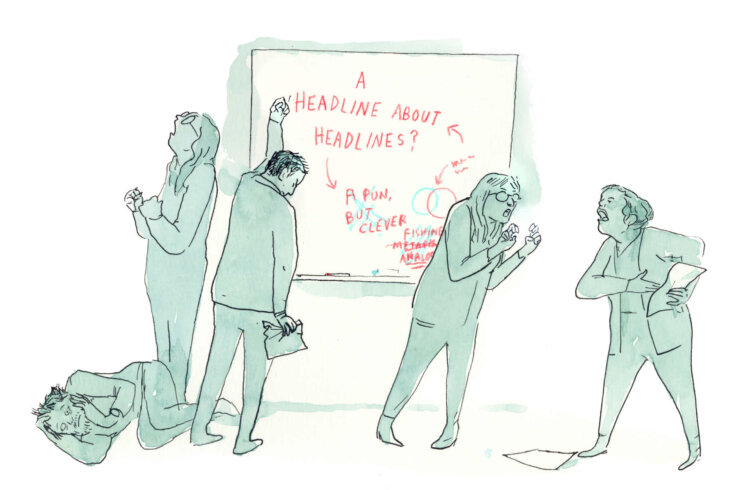
In house, we call them heds and deks. Also: treatments, display, or sells. They are some of my favourite things to write at The Walrus. It’s our chance as editors to tell readers why something is interesting, and, in doing so, create a voice for the magazine. If we’re lucky, the perfect headline strikes like lightning. Such luck is rare. Weighing word choices can eat up a chunk of your day. You want to be bold but avoid clickbait, provoke without misleading. SEO—search engine optimization—is part of the toolkit. Testing out trending terms is good practice. A better habit is striving for surprise. Wins are measurable. A sharp treatment might make the difference between 500 readers and 50,000.
Display is the darkest of the editorial arts. Like most newsrooms, we’ve learned to make treatments specific to how people encounter a story. In print, where the format promotes deep focus, we can afford to be more literary, more thoughtful. Web is a whole other game. Web is about reaching a wide audience, and quickly. Sells take into account the changes that have transformed media: shrinking attention spans, ceaseless scrolling, distraction. Maybe we go short (“Don’t Get Sick in Quebec”). Maybe we pick a narrative tack (“After 124 Years, One of Canada’s Oldest Independent Newspapers Dies”). Maybe we highlight the most contentious aspect of a story as a way of cutting through the noise (“How the Giller Prize Became Associated with Genocide”). You want to avoid undermining a story’s depth and context. But the framing has to work fast. Readers ration their time ruthlessly; we have one chance to catch their eye.
This month, our cover story is about a once-celebrated behavioural ecologist who fabricated data, deceiving journals and peers. Thinking about academic fraud led me to dwell on systemic flaws within journalism: namely, editing for the traffic scoreboard. As in academia, the pressure for attention can incentivize dishonest practices. I always worry about ultra-confident display compromising complexity and nuance. But then, I’m more worried about a sincere and pedestrian sell turning people off. I want The Walrus to be a credible news provider; I also want us to be read. How to achieve both without losing your soul? Maybe, as Beckett recommended, you fail again, and fail better. Actually, that’s not a bad hed for this letter.







